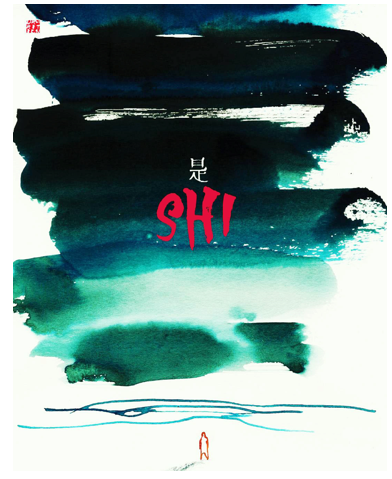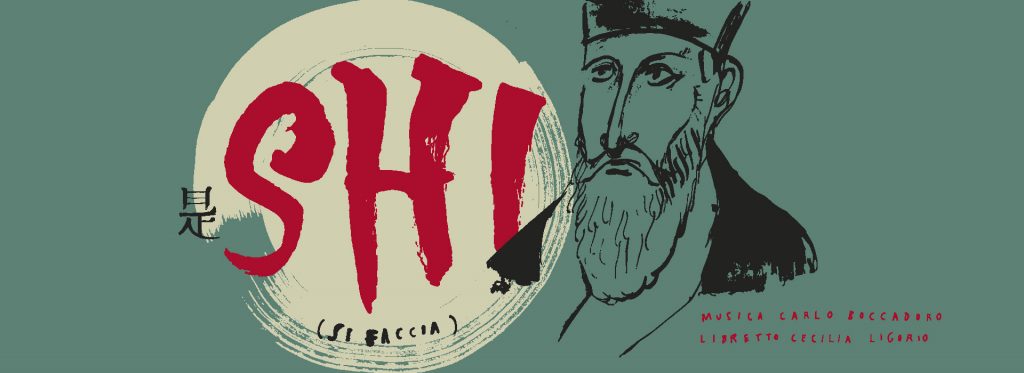SHI (to be): Directed by Cecilia Ligorio

SHI (to be) chamber opera inspired by the life of Father Matteo Ricci with libretto by Cecilia Ligorio.
A new production commissioned to Carlo Boccadoro and Cecilia Ligorio to celebrate the life of Father Matteo Ricci, who was born in Macerata and is considered the most famous Western intellectual in Chinese culture. Despite being geographically thousands of miles apart, Macerata and Beijing are nowadays culturally close thanks to the heritage handed down from the courageous Jesuit.
The performance lasts 75 minutes without a break.
-
Il viaggiatoreSimone Tangolo
-
MatteoRoberto Abbondanza
-
L'uomo che guardaBruno Taddia
-
PianoforteAndrea Rebaudengo
-
PianofortePaolo Gorini
-
Tekraktis Percussioni Ensemble
SHI (TO BE): SYNOPSIS
Biographical notes. On 10th September 1583, thirty years after the first Jesuit attempt by Father Francesco Saverio of the Compagnia di Gesú (Society of Jesus) to settle in the Far East, a young Father named Matteo Ricci gained permission to enter China. He would never leave that country, a place he came to know and shared with others. Born in Macerata in 1552 to a wealthy family of merchants, he was advised by his father to study law. However, he gave up his studies without the family’s permission to join the order of Jesuits. In 1577 he entered the Collegio Romano where he took humanistic and scientific studies and where he was noticed by Father Cristoforo Clavio for his reflective and mnemonic skills. His intellectual gifts made him a privileged candidate for carrying out evangelization missions in the most hostile lands as for Catholic indoctrination and in 1578 he was sent to Lisbon to sail to the East. After arriving in Macau, he was assigned to the Chinese mission by the Valignano Visitor, who was responsible for the Jesuit missions in East Asia. It was a long and difficult one-way journey towards the heart of an unknown country, a culture which had never been previously studied. He built four residences (Zhaoqing, Shaozhou, Nanchang, and Nanjing), published several books, gave up hope several times, and established close and strong relationships. On 24th January 1601, 18 years after his arrival in China, he was given permission to enter Beijing and from then on, he never left until his death in May 11th 1610.
Building bridges. Ricci, together with his mentor Valignano, believed that in order to be heard by the Chinese people it was of primary importance to know the Chinese culture, its language, traditions, beliefs and fears. Ricci and his companions were the first to succeed in finding and implementing a successful form of intercultural communication between Europe and China. Ricci believed that the best way to evangelise China was to first convert the ruling class. In sixteenth-century China, intellectuals ruled the country. Both Mandarins and eunuchs, in fact, had to pass a series of difficult state exams to run for public offices so as to prove their perfect knowledge of Confucius’ philosophy. Ricci rightfully believed that his deep knowledge of mathematics, science, geography, philosophy, astronomy, and literature could entice the attention of the Chinese ruling class, thus disseminating and sharing his knowledge throughout all his life. During the years of his mission, he wrote numerous texts to make Eastern culture known to the West and vice versa.
The Emperor Ricci’s experience in China coincided with the Wanli Empire of the Ming Dynasty. Li Mandou (Ricci’s Chinese name) spent his entire life and efforts in trying to convert Wanli. In order to do that, he first had to enter Beijing. Wanli, also known as Tianzi, the son of Heaven and the legitimate Lord of the World, acceded to the throne when he was nine years old but in adulthood he gradually withdrew from public life and government. Ricci himself, talking about China, once wrote: “Nowadays, no one speaks to the king, except the eunuchs, who stay in the intimacy of the palace, and ignoring what these eunuchs are doing there, which is not useful for our purpose, all the others speak only in their own defence”. The representation of China emerging from Ricci’s letters to Valignano at the beginning of his experience is not positive, but it improved over the years. Wanli was afraid of lust and gluttony, the same fear which had forced him to voluntarily live in exile in his rooms within the Forbidden City. Once the Emperor found out that the Jesuit missionaries had arrived in the country, he asked the eunuchs to spy on Ricci for days. For his part, Ricci had sent several precious gifts over the years so that Wanli would acquiesce to meet him. They finally met in 1601. In January 1601 the foreign Ricci was invited to the palace together with his companion Diego Pantoja. The emperor, who would never leave his room, wanted a full size portrait of Ricci to see the face of the builder of the extraordinary clock, the Manicordio, and the maps of World he had received as gifts from Ricci himself. Therefore, an intense and close relationship between the missionary and the most important man of the Chinese empire began. It was a special relationship based on mutual esteem and curiosity. Despite the fact that Ricci never saw the emperor, this man influenced all his life and work. Ricci’s companions wrote that Ricci’s last thoughts went to the Chinese emperor who never wanted to meet him. After learning of Ricci’s death, he agreed to Father Pantoja’s request and he suspended for Xitai Li Mandou the secular law which required all foreigners who died in China to be buried in their motherland. The Master of Rites wrote: “Since Ricci lived in the shadow of your Majesty for so long to be considered a Chinese citizen, and since your Majesty allowed him to rely on the state economic support, how could you let him not be buried? Pantoja and his companions hope that what happens after death is the same that happened in life. Consequently, we hope that your great clemency with the living will extend to the dead as well”. Wanli took the brush and wrote by his own hand: “Shi!” (it will be).
Accessibility link
http://demoweb.jef.it/sferisterio/macerata-festival-off/accessibilita/
